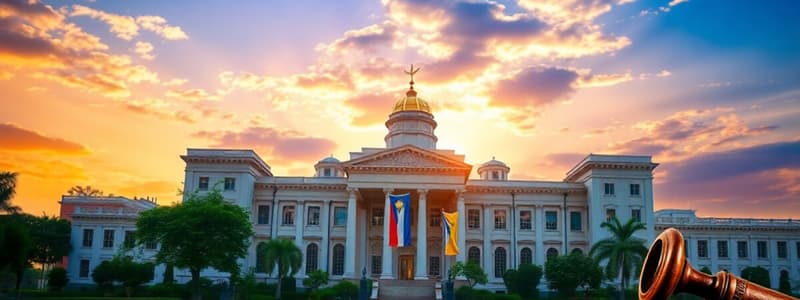Podcast
Questions and Answers
What is the article that discusses independent foreign policy?
What is the article that discusses independent foreign policy?
Art. 2 sec 7
Which article allows Congress to propose amendments?
Which article allows Congress to propose amendments?
Art. 17
What is the section that addresses compulsory military and civil service?
What is the section that addresses compulsory military and civil service?
Art. 2, Sec. 4
What section mentions the separation of church and state?
What section mentions the separation of church and state?
Which article refers to the right to life of the unborn?
Which article refers to the right to life of the unborn?
What is the article that contains provisions for eminent domain?
What is the article that contains provisions for eminent domain?
What section of the Constitution deals with legislative powers?
What section of the Constitution deals with legislative powers?
What article addresses the separation of powers?
What article addresses the separation of powers?
The right to renunciation of war is found in ____.
The right to renunciation of war is found in ____.
Which article discusses the concept of sovereignty over the islands?
Which article discusses the concept of sovereignty over the islands?
article 2 sec 3 states that military acts as a guardian of sovereignty.
article 2 sec 3 states that military acts as a guardian of sovereignty.
Flashcards are hidden until you start studying
Study Notes
Module 1 Concepts
- Independent Foreign Policy: The Philippines has an independent foreign policy guided by the principle of national interest, as outlined in Article 2 of the Constitution.
- Constitutional Supremacy: The Constitution is the supreme law of the land, as held in the Cruz case (2015), meaning all other laws and actions must be consistent with its provisions.
- Congress Proposing Power: The Constitution (Article 17) grants Congress the exclusive power to propose laws and resolutions. No other entity can propose a bill.
- Compulsory Military & Civil Service: The Constitution (Article 2, Section 4) mandates mandatory military and civil service for all citizens, reflecting the principle of shared responsibility for national defense and public service.
- People as Framers: The preamble and Section 4 of the Philippine Constitution acknowledge the people as the ultimate source of power and authority, emphasizing the foundation of a democratic state.
- Amendment or Revision: The Lambino v. COMELEC case established that the process of amending or revising the Constitution involves specific requirements and procedures, safeguarding against arbitrary changes.
- Separation of Church & State: The Constitution (Article 2, Section 6) guarantees a strict separation of church and state, upholding government neutrality in religious matters.
- Freedom of Religion: Article 17, Section 2 and Republic Act 6735 provide legal frameworks for freedom of religion, securing the right to practice and propagate one's beliefs without undue restrictions.
- Ratified Effect: The Constitution (Article 18, Section 27) signifies that upon ratification, amendments or revisions become integral parts of the Constitution, binding upon the government and citizens.
- Violation of Domicile Rights: American jurisprudence and provisions within the Penal Code (Article 211) define and protect against unlawful entry or intrusion into private residences, guaranteeing the right to privacy in one’s home.
Module 2 Concepts
- Police Power: Article 12, Section 17 of the Constitution grants the government the authority to enact laws and regulations to promote public health, safety, morals, and general welfare. -Eminent Domain: Article 12, Section 18 allows the government to take private property for public use upon just compensation, balancing individual rights with societal needs.
- Territorial Definition: Article 1 of the Philippine Constitution defines the national territory, including its landmass, waters, and airspace, as integral elements of the country's sovereign domain.
- Archipelago: Article 47 and UNCLOS III recognize the Philippines as an archipelago, a chain of islands, defining its geographical distinctiveness and maritime boundaries.
- Archipelagic Doctrine: Article 1, Paragraph 2 of the Constitution asserts the Archipelagic Doctrine, connecting all islands through territorial sea boundaries, providing a framework for determining its sovereignty.
- Sovereignty Over Islands: RA 9522 and the legal framework under UNCLOS III establish the Philippines' sovereignty over the Kalayaan Island Group (KIG) as well as the Scarborough Shoal, affirming its claim over these territories.
- Archipelagic Waters & Internal Waters: Article 53 of UNCLOS III outlines the jurisdiction of the Philippines within its archipelagic waters, which encompass all waters within the baselines connecting its outermost points, providing exclusive rights for control and resource extraction.
- Contiguous Zone: This refers to a zone extending 24 nautical miles beyond the territorial sea where the Philippines can exercise limited control over activities that may impact its security, customs, or fiscal measures.
- Exclusive Economic Zone (EEZ): Article 57 of UNCLOS III defines the EEZ as an area extending 200 nautical miles from the baseline, where the Philippines has exclusive rights to explore and exploit marine living and non-living resources.
- Continental Shelf: Article 76 of UNCLOS III states that the continental shelf extends beyond the 200-mile limit, where coastal states have special rights to explore and exploit natural resources.
- Low Tide Elevation: Article 1, Section 13 of UNCLOS defines low tide elevations (which are submerged at high tide) as not having territorial seas, clarifying their legal status and delimitation.
- President's Foreign Policy Power: This power is derived from Article 2, Section 7 of the Constitution, enabling the President to formulate and execute the country's foreign policy, including diplomatic relations, trade agreements, and treaties. -Separation of Powers: The Philippine Constitution establishes three distinct branches of government – Legislative (Article 6), Executive (Article 7), and Judiciary (Article 8), promoting checks and balances and preventing the concentration of power in a single entity.
Module 3 Concepts
- State Immunity: Article 16, Section 3 of the Constitution grants state immunity, meaning that the government generally cannot be sued without its consent.
- Express Consent: Act 3821 provides an example of express consent, where the government explicitly allows itself to be sued in specific circumstances. -Commonwealth Act 327, Amended by Presidential Decree 1441: These legal instruments further define and outline the rules and procedures for asserting claims against the state.
- Just Compensation: Article 3, Section 7 of the Constitution guarantees just compensation for private property acquired through eminent domain, requiring fair market value and ensuring proper payment to the property owner.
- State Immunity Exceptions: Cases like Ministerio v. CFI and Amigable v. Cuenca established exceptions to state immunity, acknowledging instances where the state can be sued for acts performed by its agents in a private capacity.
- Suability Not Liability: The UP v. Dizon case determined that suability, or the ability to sue the government, does not equate to liability, meaning the state can still be sued but may not always be held liable.
- Revenue Funds and Public Treasury: The UP v. Dizon decision also reinforced the principle that revenue funds and the public treasury are not subject to direct seizure by creditors, protecting essential government functions.
- Sovereignty of the People: Article 2, Section 1 posits that sovereignty rests with the people, emphasizing their ultimate authority in guiding the affairs of the nation.
- Democratic and Republican State: The Philippine Constitution (Article 4, Section 4) and the US Constitution explicitly declare the Philippines as a democratic and republican state, emphasizing participatory governance and representative systems.
- Renunciation of War: The Constitution (Article 2, Section 2) explicitly renounces war as an instrument of national policy, promoting peaceful resolution of conflicts.
- Military as Guardian of Sovereignty: The Constitution (Article 2, Section 3) designates the Armed Forces of the Philippines as the primary guardian of national sovereignty, tasked with defending the country's territorial integrity and security.
Studying That Suits You
Use AI to generate personalized quizzes and flashcards to suit your learning preferences.




